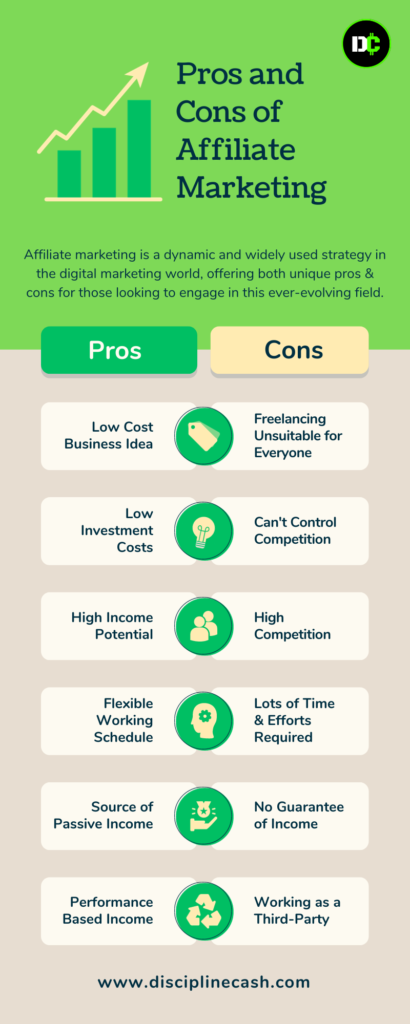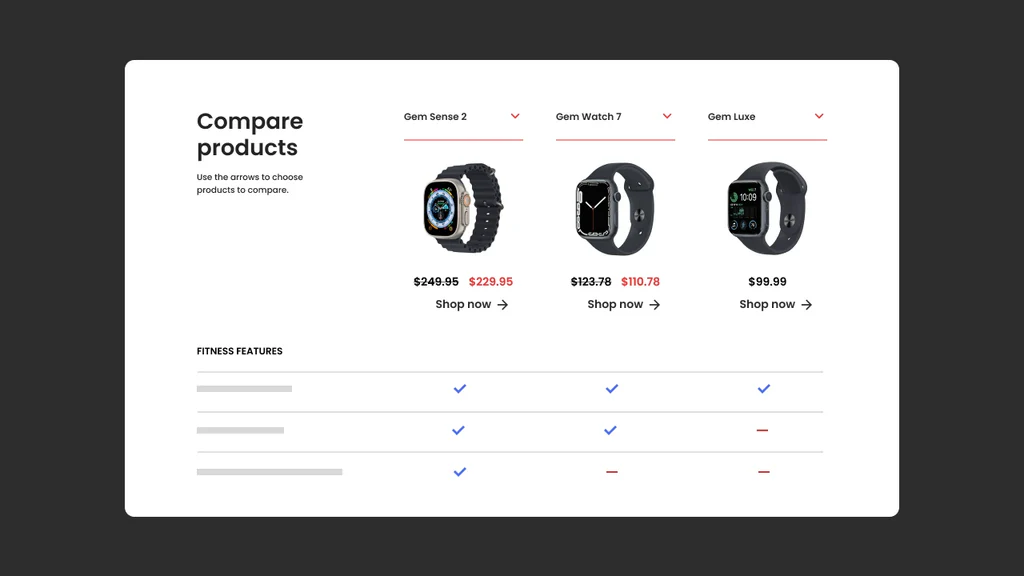Imagine Sarah, a new graduate in 2025, finding financial freedom through recommending products she loves online. That’s affiliate marketing: earning commissions by promoting others’ products.
Simple, right?
In today’s booming digital world, it’s a powerful way to make money, especially with AI tools simplifying the process. This guide will show you what is affiliate marketing, how to start, choose products, create content, and use AI to succeed in affiliate marketing in 2025.
How Affiliate Marketing Works: The Simple Breakdown
Affiliate marketing, at its core, is about connecting people with products they’ll love. Let’s look at the key players and how it all comes together.
Here’s a breakdown of the major players in affiliate marketing:
The 4 Key Players: The Heart of Affiliate Marketing
To fully learn affiliate marketing, you need to know the four main players involved.
1. Merchant/Advertiser:
This is the company or individual that creates the product or service. Think of a local artisan who makes handmade soaps or a massive online retailer like Amazon.
They have something to sell and are looking for ways to reach more customers.

2. Affiliate/Publisher (That’s You!):
You’re the person who promotes the merchant’s products. You could be a blogger, a social media influencer, or anyone with an online audience.
Your job is to create content that encourages people to buy the merchant’s products.

3. Customer:
This is the person who buys the product or service based on your recommendation. They’re the end goal of the whole process.

4. Affiliate Network:
This is a platform that connects merchants and affiliates. It simplifies the process of finding products to promote and tracking sales.
Not every affiliate program uses a network; some merchants work directly with affiliates. Think of it as a marketplace for affiliate offers.

How it Works: A Step-by-Step Guide
Here’s a simple breakdown of how affiliate marketing works:
- Affiliate Finds a Product: You find a product or service that you genuinely like and think your audience will benefit from.
- Affiliate Gets a Unique Link: You join the merchant’s affiliate program and receive a unique affiliate link. This link tracks any sales that come from your promotion.
- Affiliate Promotes the Link: You share your affiliate link with your audience through your blog, social media, or other online channels.
- Customer Clicks and Buys: A customer clicks on your affiliate link and makes a purchase.
- Affiliate Earns a Commission: You earn a commission for every sale made through your affiliate link.

The Role of Tracking and Cookies
How Sales Are Tracked:
Affiliate programs use tracking tools, often cookies, to record when someone clicks on your affiliate link and makes a purchase. Cookies are small pieces of data stored on the user’s computer.
They help the merchant identify that the sale came from your referral. Think of it like a digital receipt that says you sent the customer.
Privacy and Ethics:
It’s important to be transparent with your audience about your affiliate relationships. Always disclose that you’re using affiliate links. Many countries require this by law.
Assure your audience that cookies are used for tracking sales, not for stealing personal data.
Promote only products and services you believe in and that align with your audience’s interests.
![]()
Pros and cons of affiliate marketing:
Affiliate marketing, like any other business model, offers both advantages and disadvantages.
On the plus side, it’s inexpensive, low-risk, and quite simple to scale. Affiliates can work from wherever they are and promote products that they are passionate about. Furthermore, many people are attracted to it because of the potential for passive income.
However, affiliate marketing has its drawbacks. Success often requires time, patience, and a significant amount of effort in content creation and audience building. Furthermore, affiliates must rely on the merchant’s conversion rates and commission structure, which may be beyond their control.

What is High-Ticket Affiliate Marketing?
High-ticket affiliate marketing is a valuable subcategory of affiliate marketing that focuses on promoting high-value products or services. These products typically have a higher commission rate, allowing affiliates to make more per sale.
However, high-ticket products require a more advanced marketing approach due to their high price point and the need for trust among customers.
Affiliate Marketing in 2025: What’s Changing?
The digital world is constantly changing, and affiliate marketing is no exception. Here’s what you need to know about the trends shaping affiliate marketing in 2025.
A. AI and Automation: Your New Affiliate Marketing Superpowers
Artificial intelligence (AI) is transforming how affiliate marketers work, making it easier to find opportunities and optimize campaigns.
AI for Content, Keywords, and Ads:
AI tools can help you generate content ideas, write product descriptions, and even create social media posts.
AI-powered keyword research tools can identify high-potential keywords that your target audience is searching for.
AI ad platforms can optimize your ad campaigns for maximum ROI, showing your ads to the right people at the right time.
The Rise of AI Affiliate Tools
In 2025, you’ll find a wide range of AI tools designed specifically for affiliate marketers. These tools can automate tasks like product research, competitor analysis, and link tracking.

Prompt Engineering for Affiliates
Prompt engineering is the act of crafting prompts for AI tools to get the best results. A well-crafted prompt for an AI content creation tool can produce highly relevant and engaging content.
Example: Instead of “write a product review,” a good prompt would be “write a product review for the ‘XYZ’ product, highlighting its benefits for users with sensitive skin, and include 3 long tail keywords.”
B. The Impact of Social Commerce and Live Shopping
Social media is no longer just for sharing photos and videos; it’s a powerful sales platform.
Affiliate Marketing on Social Platforms
Platforms like TikTok, Instagram, and YouTube Shorts are becoming major hubs for affiliate marketing. Short video content is especially effective for showcasing products and driving sales.

Live Shopping and Affiliate Partnerships
Live shopping events are gaining popularity, allowing affiliates to showcase products in real-time and interact with potential customers.
Affiliate partnerships with influencers and creators on these platforms can greatly increase your reach.

C. The Importance of Authentic Content and Influencer Marketing
Trust is essential in affiliate marketing.
Building Trust with Genuine Reviews
Customers are more likely to buy products from affiliates they trust. Focus on creating genuine reviews and recommendations based on your own experiences.

Micro-Influencers and Niche Communities
Micro-influencers, with smaller but highly engaged audiences, are becoming increasingly valuable in affiliate marketing.
Focus on building relationships with niche communities and providing targeted recommendations.

D. The Growth of Sustainable and Ethical Practices
Consumers are increasingly conscious of the impact of their purchases.
Promoting Eco-Friendly Products
Promote products and services that are environmentally friendly and socially responsible.

Transparency and Disclosure
Always disclose your affiliate relationships to your audience. This builds trust and ensures you’re complying with regulations.
E. The Rise of Personalized Marketing
Leveraging Personalization
Using data to understand your audience’s preferences allows you to deliver highly targeted product recommendations.
This can include recommending products based on the users previous purchase history, or by the content they have interacted with on your site.

Finding Your Winning Niche: A 2025 Guide
Choosing the right niche and products is crucial for affiliate marketing success. Here’s how to find your sweet spot.
A. Identifying Profitable Niches in 2025
Finding a niche that’s both profitable and aligns with your interests is key.
Trending Topics and Emerging Markets
Keep an eye on trends in technology, health and wellness, sustainable living, and online education.
Emerging markets may include AI-powered tools, personalized health solutions, or virtual experiences.
Using Tools Like Google Trends and Keyword Research Platforms
Google Trends helps you see what people are searching for and identify rising trends.
Keyword research tools like Ahrefs or SEMrush can help you find high-volume, low-competition keywords.
How to Use AI Tools to Discover Niche Markets
AI tools can analyze market data and identify untapped niche opportunities.
AI tools can analyze social media trends to help identify what people are talking about.
AI tools can also analyze customer product reviews to find common pain points that a niche product can solve.
B. Evaluating Affiliate Programs and Networks
Not all affiliate programs are created equal. Here’s what to consider:
Commission Rates, Payment Terms, and Product Quality
Look for programs with competitive commission rates and reliable payment schedules.
Prioritize high-quality products that you can confidently recommend.
Research the reputation of the company offering the affiliate program.

(Image of Amazon Associates affiliate commission rates)
Reputable Affiliate Networks and Direct Partnerships
Affiliate networks like ShareASale, CJ Affiliate, and Amazon Associates offer a wide range of programs. Direct partnerships with merchants can sometimes offer better commission rates or exclusive deals.
C. Analyzing Competitors and Market Demand
Understanding your competition is essential.
Using SEO Tools to Assess Keyword Competition
SEO tools help you see how difficult it is to rank for specific keywords.
Analyze your competitors’ keyword strategies to identify opportunities.
Analyzing Competitor Content and Strategies
Study your competitors’ blog posts, social media content, and marketing campaigns. Identify what’s working for them and find ways to differentiate yourself.
Look for gaps in the market that your content can fill.

Crafting Content That Converts: 2025’s Affiliate Content Playbook
Creating engaging content is your key to affiliate success. Here’s how to make your content stand out.
A. Content Formats for 2025: Go Beyond the Blog Post
In 2025, diverse content formats are essential for capturing audience attention.
Video Reviews and Tutorials
Video content is highly engaging and allows you to showcase products in action.
Create product reviews, tutorials, and unboxing videos to build trust and drive sales.

Interactive Quizzes and Polls
Interactive content increases engagement and provides valuable insights into your audience’s preferences.
Use quizzes and polls to gather data and personalize your recommendations.
“Best of” Lists and Comparison Guides
“Best of” lists and comparison guides help users make informed purchasing decisions.
Create comprehensive guides that compare different products in your niche.
Short-Form Content Creation
Platforms like TikTok, Instagram Reels, and YouTube Shorts demand short, engaging videos.
Create bite-sized content that showcases products and drives traffic to your affiliate links.
(Image Suggestion: A collage of short-form video content on different social media platforms.)
B. Optimizing Content for Search Engines and User Experience
Make your content easy to find and enjoyable to consume.
Keyword Research and On-Page Optimization
Use keyword research tools to identify relevant keywords and incorporate them naturally into your content. Optimize your title tags, meta descriptions, and headings for search engines.
Mobile-Friendliness and Website Speed
Ensure your website is mobile-friendly and loads quickly.
Optimize images and videos for faster loading times.

Using Clear Headings, Visuals, and Multimedia
Use clear headings to break up your content and make it easy to read.
Incorporate high-quality images, videos, and infographics to enhance engagement.
C. Building Trust and Credibility: The Foundation of Affiliate Success
Trust is paramount in affiliate marketing.
Sharing Personal Experiences and Case Studies
Share your own experiences with the products you promote. Use case studies to demonstrate the effectiveness of your recommendations.

Providing Valuable and Informative Content
Focus on creating content that provides value to your audience.
Answer their questions, solve their problems, and provide helpful information.
Engaging with Your Audience and Responding to Comments
Engage with your audience on social media and in the comments section of your blog. Respond to their questions and comments promptly.

Driving Traffic and Sales: Your Affiliate Marketing Growth Engine
Getting traffic and converting it into sales is the ultimate goal. Here’s how to make it happen.
A. SEO and Content Marketing: The Foundation of Visibility
Creating High-Quality Blog Posts and Articles
Produce informative and engaging content that targets relevant keywords. Focus on providing value to your audience and answering their questions.
Building Backlinks and Improving Website Authority
Earn backlinks from reputable websites to improve your search engine rankings. Create high-quality content that others will want to link to.
B. Social Media Marketing and Community Building: Connect and Engage
Engaging with Followers and Building a Loyal Audience
Interact with your followers on social media and build a strong community. Share valuable content and respond to comments and messages.
Using Social Media Ads and Influencer Collaborations
Use targeted social media ads to reach a wider audience. Collaborate with influencers to promote your affiliate products.
C. Email Marketing and List Building: Nurture Your Leads
Creating Valuable Email Content and Offers:
Build an email list and send valuable content and exclusive offers to your subscribers. Use email marketing to nurture leads and drive sales.
Segmenting Your Audience and Personalizing Your Messages
Segment your email list based on interests and behaviors.
Personalize your messages to increase engagement and conversions.
D. Paid Advertising: When to Invest
Brief Overview of Paid Advertising
Paid advertising, such as Google Ads or social media ads, can drive targeted traffic to your affiliate links.
It’s most effective when you have a clear understanding of your target audience and a well-optimized landing page.
When it is a Good Idea?
Paid advertising is beneficial when you want to quickly drive traffic to a specific product or offer. It can also be effective for testing different marketing strategies.
Use it carefully, and be sure that the profit from the ad is greater than the cost.
Affiliate Marketing with Integrity: Ethical Practices for 2025
Building a sustainable affiliate business means prioritizing ethics and transparency. Here’s how to do it right.
A. Disclosure and Transparency: Building Trust Through Honesty
Clearly Disclosing Affiliate Relationships
Always inform your audience when you’re using affiliate links. A simple statement like “As an affiliate, I earn from qualifying purchases” is sufficient.
Place disclosures in prominent locations, such as at the beginning of blog posts or in video descriptions.
Building Trust with Your Audience
Transparency builds trust and strengthens your relationship with your audience. Honesty fosters loyalty and encourages repeat engagement.
B. Avoiding Scams and Promoting Quality Products: Protecting Your Audience
Researching Products and Companies Before Promoting Them
Thoroughly research products and companies before recommending them to your audience.
Look for reviews, testimonials, and any red flags that might indicate a scam or low-quality product.

Protecting Your Audience from Scams
Never promote products or services that you suspect are scams or misleading. Prioritize your audience’s well-being over potential commissions.

C. Staying Updated with Regulations and Guidelines: Compliance is Key
FTC Guidelines and Other Relevant Regulations
Familiarize yourself with the FTC’s guidelines on affiliate marketing and endorsements.
Stay updated on any changes to regulations that may affect your affiliate activities.
Be aware of international regulations if you have global audiences.
Importance of staying up to date
The world of online regulation is always changing. It is your responsiblity to make sure that you are always in compliance.
Your Affiliate Marketing Journey Starts Now: Next Steps
You’ve learned the fundamentals of affiliate marketing. Now, it’s time to take action and turn your knowledge into results.
A. Encourage Readers to Take Action: Start Your Affiliate Adventure
Join an Affiliate Program
“Ready to dive in? Start by exploring affiliate programs in your chosen niche. Look for programs with products you genuinely like and that resonate with your audience.”
“Don’t be afraid to start small. Even promoting a single product can be a great learning experience.”
Start a Blog or Social Media Channel
“If you don’t have an online presence, now’s the time to build one. Creating a blog or engaging on social media platforms is essential for reaching your target audience.”
“Start by creating content that provides value and addresses your audience’s needs.”
Learn More and Stay Updated
“Affiliate marketing is constantly evolving, so continuous learning is crucial. Stay updated on the latest trends, strategies, and tools.”
B. Provide Resources and Tools: Your Affiliate Marketing Toolkit
Helpful Websites and Tools
“Here are some resources to help you along your journey:”
“Link to reputable affiliate networks (e.g., ShareASale, CJ Affiliate).”
“Link to keyword research tools (e.g., Google Keyword Planner, Ahrefs).”
“Link to Google Trends.”
“Link to FTC guidelines.”
Affiliate Marketing Communities
“Join online communities and forums to connect with other affiliate marketers, share insights, and learn from each other.”

C. Offer Ongoing Support and Guidance: Let’s Connect
Connect on Social Media
“Follow us on [Your Social Media Platforms] for more affiliate marketing tips and updates.”
“Engage with us and ask any questions you may have.”
Subscribe to Our Email Newsletter
“Subscribe to our email newsletter for exclusive content, updates, and special offers.”
“We’ll keep you informed about the latest trends and strategies in affiliate marketing.”
Reach Out via Email
“Feel free to contact us via email at [Your Email Address] for any personalized guidance or support.”
Conclusion
Affiliate marketing can be a rewarding and profitable business if approached correctly. It provides a low-risk, low-cost method of making money online while endorsing goods you believe in.
While it requires effort, patience, and strategic planning, the potential for passive income makes it an attractive option for many.
But it’s important to keep in mind that affiliate marketing success doesn’t happen right away. It includes always learning new things, adjusting to market changes, and improving your approach.
However, if you are consistent and use the appropriate strategy, you may make affiliate marketing a successful business.
Frequently Asked Questions (FAQ) About Affiliate Marketing
Q1: How much money can I realistically make with affiliate marketing?
A: The income potential varies greatly. It depends on factors like your niche, audience size, and the effort you put in. Beginners might start with a few hundred dollars a month, while experienced affiliates can earn thousands. It’s not a get-rich-quick scheme, but a sustainable business model with consistent effort.
Q2: Do I need a website to start affiliate marketing?
A: While a website or blog is ideal for building a long-term affiliate business, you can start without one. Social media platforms, YouTube channels, and even email marketing can be used to promote affiliate links. However, a website provides more control and credibility.
Q3: How long does it take to start making money with affiliate marketing?
A: It varies. Some people see their first commissions within a few weeks, while others might take several months. Building an audience, creating quality content, and establishing trust takes time. Be patient and consistent.
Q4: What are the best affiliate programs for beginners?
A: Consider programs that offer good support, training, and easy-to-promote products. Amazon Associates is popular for its wide range of products. Look for programs in your niche that align with your audience’s interests. Research commission rates, payment terms, and product quality.
Q5: What is a niche, and how do I choose one?
A: A niche is a specific segment of the market. Choosing a niche involves identifying your interests, researching market demand, and assessing competition. Look for a niche with a passionate audience and products you can genuinely recommend.
Q6: How do I get traffic to my affiliate links?
A: You can drive traffic through SEO, content marketing, social media, email marketing, and paid advertising. Focus on creating valuable content that attracts your target audience.
Q7: What are cookies, and how do they work in affiliate marketing?
A: Cookies are small data files stored on a user’s computer. They track when someone clicks your affiliate link and makes a purchase. This allows merchants to attribute sales to your referrals and pay you commissions.
Q8: How do I disclose my affiliate relationships?
A: Clearly state that you earn commissions from qualifying purchases. Place disclosures in prominent locations, such as at the beginning of blog posts, in video descriptions, or on social media posts. Follow FTC guidelines and be transparent with your audience.
Q9: What are some common mistakes beginners make in affiliate marketing?
A: Common mistakes include promoting low-quality products, neglecting SEO, not building an email list, and failing to engage with their audience. Focus on providing value, building trust, and staying consistent.
Q10: How do I stay updated on affiliate marketing trends?
A: Follow industry blogs, subscribe to newsletters, join online communities, and attend webinars. Continuous learning is essential for success.
Q11: Is affiliate marketing legitimate?
Amazon, eBay, Etsy, and many more respectable businesses throughout the world have acknowledged and implemented affiliate marketing as a genuine business model.
However, it is at risk from scammers, as with any other online business. It’s critical to investigate and select trustworthy affiliate networks, concentrate on endorsing high-quality goods, and place a high value on audience transparency.







